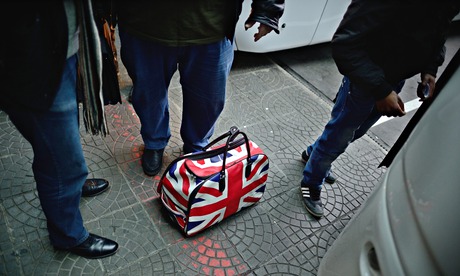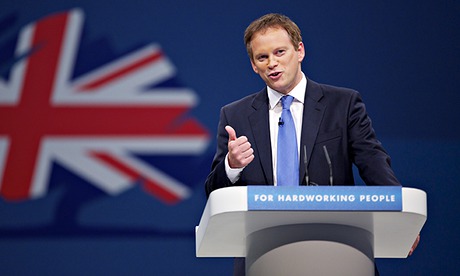From the first experiments with British Aerospace through British Telecom, water and electricity to the NHS and Royal Mail
Richard Seymour
guardian.co.uk, Thursday 29 March 2012 11.03 BST larger
Royal Mail is being auctioned, and not necessarily to the highest bidder (and stamp prices are going up). The London fire brigade is outsourcing 999 calls to a firm called Capita, at the behest of the oleaginous chair of the capital's fire authority, Brian Coleman. Multinationals are circling hungrily around NHS hospitals. Schools are already beginning to turn a profit. In the technocratic nomenclature of the IMF, this would be called a "structural adjustment programme", but that doesn't really capture the sweeping scale of the transformation. We can see this through a potted history of privatisation in the UK.
• 1979-81: Experimentation
The Tories had long been committed to some policy of de-nationalisation. In response to the prolonged crisis of the 1970s, in which the Tories had struggled to maintain their parliamentary dominance, the Ridley report devised for the Thatcher shadow cabinet recommended a policy of breaking up the public sector and dismembering unions. Privatisation was at first subordinate to other policy themes, above all wage suppression to control inflation. But the first Thatcher administration did successfully introduce a degree of privatisation in some large public sector companies, above all British Aerospace and Cable & Wireless. At this stage, however, the focus was on privatising already profitable entities to raise revenues and thus reduce public-sector borrowing.
•
1982-86: Lift-off
Amid the early 80s recession, the Tories had begun to propose privatisation as a potential panacea. Conservative MP Geoffrey Howe extolled the "discipline" of the marketplace. The emerging doctrine was that privatisation would make the large utilities more efficient and productive, and thus make British capitalism competitive relative to its continental rivals. In this period, the government sold off Jaguar, British Telecom, the remainder of Cable & Wireless and British Aerospace, Britoil and British Gas. The focus had shifted to privatising core utilities.
This policy did not emerge out of nowhere; it was fully embedded in the Hayekian ideas that had guided Thatcher and her cohort in opposition. But it did develop in relation to specific policy objectives. It was not just a question of stimulating private sector investment, but also of culture war intended to re-engineer the electorate along the lines of the "popular capitalism" vaunted by Thatcher, and announced in the infamous "Tell Sid" campaign.
• 1987-91: Leaps and bounds
Following the Tories' third election victory, they were sufficiently confident to roll out their most aggressive privatisation programme yet. British Steel, British Petroleum, Rolls Royce, British Airways, water and electricity were among the major utilities for sale. These privatisations provoked serious opposition, perhaps sufficient to curb any tendency toward privatisation in the NHS. Nonetheless, market-driven measures continued to be imposed in the public sector, from the "internal market" in the health service to Major's ill-fated citizen's charter.
• 1992-96: Weakness and retreat
The fourth consecutive Tory administration was weak, and quickly divided over a range of policies, above all European monetary union. But the neoliberal premises of policy embedded by Thatcher remained intact, and the government continued to push privatisations in those areas where it felt able to. Inflicting a second defeat on the miners, the government proceeded with the final sell-off of British Coal, as well as electricity generating companies Powergen and National Power, and British Rail. Michael Heseltine's attempt to privatise the Post Office was abandoned, however, due to public opposition and resistance from a backbench fearful of electoral wipeout.
• 1997-2001: New Labour's compromise
New Labour had made electoral capital out of the Tories' unpopularity over privatisation, but only pledged to stop the sell-off of air traffic control. Even this minor promise was betrayed. For, if Thatcherism had not won the argument on public services, it had so comprehensively demolished the militant left and trade unions that there was nothing to prevent Labour from adapting to neoliberalism. The major privatisation policy introduced in this period was thus an awkward compromise between a managerial leadership and Labour's electoral base, known as the Private Finance Initiative (PFI) – a fudge originally pioneered by Norman Lamont. Introduced into the London Underground, the NHS and schools, these policies raised money in the short-term without the need for higher taxes. But there was also a streak of pro-market evangelising involved. Both Peter Mandelson and his successor at the department of trade and industry believed it was the role of government to foster entrepreneurial culture.
• 2002-8: Aggressive PFI
The second and third New Labour administrations pressed aggressively for further state down-sizing and privatisation. Blair had based his 2001 re-election campaign on the extremely unpopular PFI. The calculation was that even if the measure wasn't popular, his victory would prove that there was no realistic alternative. Though there were few major sell-offs, the government's policies on the Royal Mail and the NHS had, as their logical conclusion, the privatisation of these services. Even the fiscal crisis in the NHS, resulting from the high costs of PFI initiatives, did not dampen the ardour. It was not until the credit crunch and the ensuing crisis that the pendulum began to swing, if only temporarily, in the opposite direction when Brown was forced to belatedly nationalise a string of failing banks. But even then, it was clear that the intention was to restore these companies to private ownership as quickly as possible.
• 2009-: Thatcherism Mark II?
The Tories took office without a mandate, but with no lack of confidence. Their agenda, which had emerged since 2008, was to represent the crisis of global capitalism as a crisis of public sector spending. Having already privatised the Tote and announced the sell-off of Northern Rock, with other nationalised banks to follow, they have indicated that Royal Mail will be sold off, along with probation services, roads, large sectors of education and the NHS. Even sections of the police, traditionally an ally of the right, will be privatised. Outsourcing will be extended into every possible area.
But, as in the 1980s, the aim is not primarily to reduce public-sector borrowing. The Tories know that ongoing economic crisis is not just a fiscal or financial problem. The private sector is utterly stagnant. Globally, there are trillions of pounds being retained by corporations who see no viable avenue for profitable investment. US companies are holding on to $1.7 trillion, eurozone firms sit on 2 trillion euros, and British firms have £750bn doing nothing. Accumulation-by-dispossession is one way to get that money into circulation as capital. And while the Conservatives are not as ideologically confident as in the 1980s, the scale of their proposed privatisations suggests they expect to over-ride any opposition.
In historical context, privatisation seems to answer a number of dilemmas for the Tories. By spreading market incentives, it erodes the public sector basis for Labourist politics. By opening the public sector to profit, it gets a lot of capital into circulation. And by reducing the power of public sector workers, it suppresses wage pressures, thus in theory making investment more appealing. Above all, perhaps, in shifting the democratic to market-based principles of allocation, it favours those who are strongest in their control of the market, and who also happen to represent the social basis of Conservatism.




